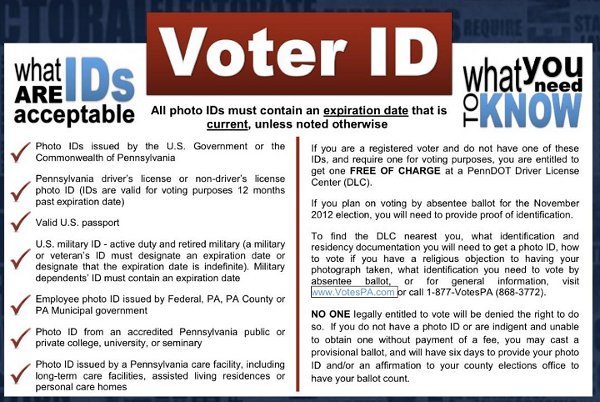Voter ID Law May Yet Fail in Pennsylvania


The victory dance by some this week when Pennsylvania’s controversial voter ID law survived its first court test may prove premature, since the law still faces at least three other likely legal challenges.
The Public Interest Law Center of Philadelphia has already filed an appeal to the Pennsylvania Supreme Court, seeking to reverse the August 15 decision of Judge Robert Simpson, denying an injunction to prevent the law from taking effect, while at the same time expressing some misgivings about both the statute and the legislative process that produced it. He did not rule on the substance of the law, but issued a limited finding that it was not unconstitutional on its face.
Barring further impediment, the law goes into effect on September 17, well ahead of the November 6 election. The law may disenfranchise more than 750,000 otherwise eligible voters from casting ballots, about ten per cent of the Pennsylvania electorate. Pennsylvania House Majority Leader Mike Turzai, a Republican, said “Voter ID, which is gonna allow Governor Romney to win the state of Pennsylvania, done,” a statement which certainly indicates partisan intent by some.
Judge Simpson, while finding in Turzai’s favor on the injunction, felt the need to call Turzai’s remarks “troubling” and “tendentious.”
In their appeal filed August 16, the Law Center asked the Supreme Court to hear the case on an expedited basis, before the law takes effect. If the court accepts the proposed timeline, it well heat oral argument the week of September 10. The Supreme Court, which currently comprises six justices, three Republicans and three Democrats, is under no obligation to hear the appeal quickly.
On a separate track, there’s a separate lawsuit pending in Pennsylvania’s second-most populous county, Allegheny, which is majority leader Turzai’s home county. In contrast to the earlier suit for an injunction on behalf of voters who would lose their right to vote, the Allegheny County challenge was brought in June by county officials. The county executive and county controller argued that the law violates both the Pennsylvania constitution and federal laws protecting the right to vote. That suit is still pending.
Additionally, the county officials say the law will cost $11 million to implement, with the state paying none of it. “So the governor is creating another unfunded mandate for all 67 counties,” Allegheny county controller Chelsa Wagner said.
The third legal challenge to Pennsylvania’s voter ID law comes from the U.S. Dept. of Justice, which has asked the state to respond to concerns that the partisan law discriminates against minorities. The Justice Dept. has asked the state for data on the Pennsylvania electorate, with a deadline next week. Depending on the analysis of the data, the Justice Dept. could file a federal lawsuit under the 1965 Voting Rights Act.
No Democrat in the legislature voted for Voter ID. The judge who blocked the injunction is Republican. This led to speculation that his decision might be biased. However, there’s no evidence to support that suspicion says a Los Angeles Times legal writer who examined it in detail.
Meanwhile, an umbrella group called the Pennsylvania Voter ID Coalition has hundreds of people on the ground educating voters and helping them get valid ID, which is more complicated that one might think. Even Governor Tom Corbett admitted he didn’t know what would be a valid ID. If this coalition of unions, churches, lawyers and civil rights workers is successful, then it won’t much matter what the Voter ID law is.
Pennsylvania should remember its constitution which says “Elections shall be free and equal; and no power, civil or military, shall at any time interfere to prevent the free exercise of the right of suffrage.”



